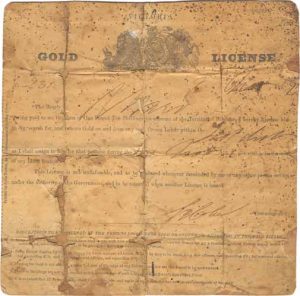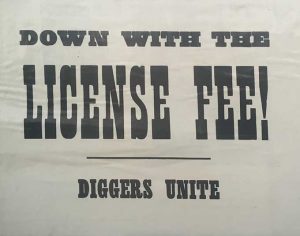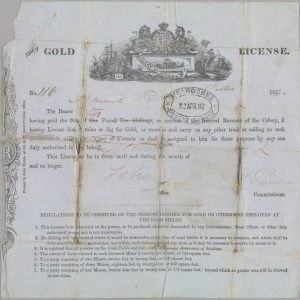Gold Licenses (The Miner’s License)

Gold License, 1852 Federation University Historical Collection.
The die is cast and fate has stamped upon the movement its indelible signature. No power on earth can now restrain the united might and headlong stride for freedom of the people of this country and we are lost in amazement while contemplating the dazzling Panorama of the Australian future. We salute the League and tender our hopes and prayers for its prosperity. The League has undertaken a mighty task fit only for a great people – that of changing the dynasty of the Country. The League does not exactly propose nor adopt such a scheme but we know what it means the principles it would inculcate and that eventually it will resolve itself into an Australian Congress. It is not for us to say how much we have been instrumental in rousing up the people to a sense of their own wrongs. We leave that to the public and the world.
These were the stirring words written by Henry Seekamp, the editor of The Ballarat Times in 1854. Seekamp was referring to the Ballarat Reform League formed on Saturday 11 November 1854 at an assembly of more than 10,000 at Bakery Hill, Ballarat. John Basson Humffray was elected Chairman, other members being British Chartists George Black, Henry Holyoake, Henry Nicholls, Thomas Kennedy, Peter Lalor, Timothy Hayes and Frederick Vern. At the subsequent meeting on 29 November the sentiment expressed by the huge crowd was one of frustration and resentment. Attorney Alexander Fraser attended ‘the only political meeting [he] had ever attended in the colony’, and ‘was at once deeply struck with the solemn earnestness of its tone, and with the absolute unanimity of sentiment which seemed to prevail; knowing, therefore, from what I myself had experienced from the abuse of local authority, what many others must have felt from a sense of perhaps more recent injustice, it appeared to me as plan as noon day that disastrous results must arise unless the policy pursued on the gold fields were completely altered, and the daily and hourly irritation caused by the collection of the license tax entirely given up.’

Down With License Fee Poster Displayed at Sovereign Hill, 2016. Ballarat Heritage Services Picture Collection
It was at this meeting that licences were burnt. It was proposed by Mr Frederick Vern, seconded by Mr Quinn in Item 3, ‘That this meeting, being convinced that the obnoxious license-fee is an imposition and an unjustifiable tax on free labor, pledges itself to take immediate steps to abolish same, by at once burning all their licenses. That in the event of any part being arrested for having no licenses, that the united people will, under all circumstances, defend and protect them’. Proposed by Mr G. Black, and seconded by Mr Wheatley, Item 4 stated, ‘That as the diggers have determined to pay no more licenses, it is necessary for them to be prepared for the contingent; as it would be utterly inconsistent, after refusing to pay a license, to call a Commissioner for the adjustment of such disputes, the parties so disputing shall each appoint one man. the two men thus appointed to call in a third, and these three decide the case finally’.

License no. 116. Issued to [?], December 1853 and valid for January and February 1854. Issued by Commissioner Plu[..] . State Library of Victoria Collection (H5005/5)
BALLARAT DIGGINGS
The yield is immense, seemingly inexhaustible the gold lies in ‘pockets’ in the blue slatey clay, and may be picked out with a knife point, so rich indeed is it, that many have abandoned cradle workings for tin dishes which have yielded from 2 – 3 ounces in one washing. Many will make FORTUNES. – This party applied for an escort and were told by Captain Dana that he would see them damned before he would give an escort to such a lot of fellows! The gallant Captain was told that the escort was applied for by virtue of the licences which paid for Government protection – not that they required it: as they were capable of protecting themselves. I saw the party afterwards cleaning their pistols preparative to a start. They declared to me, that from the mal-management of the Government, the insults they had been subjected to, and the inconvenience forced upon them, they were doubtful of returning and deemed it preferable to abandon the present rich field and explore elsewhere than remain in Ballarat. The escort was ultimately granted. I would remark ‘en passant’ that the redoubtable Captain Dana diversified his exploits on Saturday, by knocking down a young man named Thomas with the ‘butt’ of his whip. The young man fell into a pit from the effect of the blow. It is gratifying to record such a gallant military exploit – a repetition of the like of which will render it a matter of necessity to place him under surveillance of his own Satanic Battalion of Black Guards – a suitable troop for such a commander.
The intention of the government forces and their preparedness to intervene in case of disorder was evident early in 1851 during an incident on the Ballarat goldfields on 21 September. Commissioner Doveton and his assistant David Armstrong explained to the diggers the government’s decision to introduce licensing fees, which attracted an angry response from the miners. A public meeting was held immediately, and when the first men came forward to pay the fee, 13 they were struck and pelted by ‘the mob’ as Dana called them. Had it not been for the presence of the Native Police, Dana reported, those diggers would have been seriously injured.
The miners were aggrieved at the licence fee of 30/- per month, payable in advance. When the government mooted an increase to 60/- per month in 1851, there were protests and talk of rebellion and taking up arms on the Ballarat Field. The squatters paid far less in fees, with often much higher returns and far less risk than the majority of miners.
‘If the Government do not alter their mode of proceeding with regard to the system of licencing, and adopt a uniform line of conduct in accordance with the printed terms of the licences, they will accelerate a catastrophe, for which they will only have themselves to blame’, observed the reporter from The Argus. Another inequality was also evident. The landowners had the right to vote because they owned land. The miners had no voting rights. They were governed by laws in which they had no say and often these were regarded as foreign laws especially by the American, Canadian, Europeans and Chinese on the gold fields. Privations such as lack of amenities, stores to buy provisions, clean water, and sanitation were commonplace. The Argus reported ‘the inequality of success of the thousands of diggers now at work’ and also commented upon ‘the numbers suffering privations’. Starvation and sickness were prevalent on most goldfields. Statistically, society on the diggings was unbalanced and the lack of female companionship and children was noticeable. Life was precarious. A few won their fortune. Many more existed on meagre amounts, subsisting on the hope of finding that exquisite glistening gold nugget!
The unrest culminated on the third of December 1854 in a short battle, which occurred in Ballarat on the Eureka Lead. The Creswick miners were heavily involved in the Eureka Affair, although they were not present at the actual battle. The military attacked the unsuspecting Ballarat miners at sunrise on that bloody Sunday morning in what we now know as ‘Eureka’. Being one of the few civil battles fought on Australian soil Eureka is of particular significance. Although short in duration it has had many far-reaching effects for our subsequent developing Australian society.
